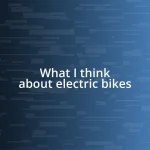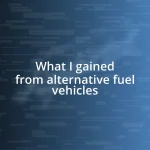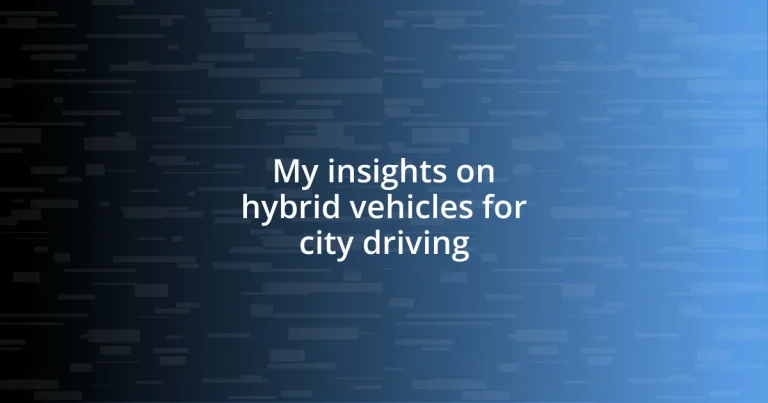Key takeaways:
- Hybrid vehicles offer significant benefits for city driving, including fuel efficiency, lower emissions, and quieter operation, particularly in stop-and-go traffic.
- Key features of hybrids such as regenerative braking, compact size, and various driving modes enhance maneuverability and sustainability, making urban commuting more enjoyable.
- When choosing a hybrid, consider size, technology features, and gather personal recommendations, as these factors can greatly impact the overall driving experience and efficiency.

Understanding hybrid vehicles
Hybrid vehicles are fascinating machines that blend the best of both worlds: the traditional gasoline engine and an electric motor. I remember my first ride in a hybrid; the seamless transition between power sources felt almost magical. It made me realize how these vehicles optimize fuel efficiency, especially in city driving where stop-and-go traffic is the norm—it’s like they know exactly how to adapt to our driving patterns.
When you think about urban commuting, the benefits of hybrids become more apparent. Have you ever sat in traffic and wished your car could just glide silently along? The electric motor does just that during low-speed driving, reducing emissions and offering a quieter experience. It’s incredibly satisfying to know that even while I’m stuck in gridlock, I’m part of the solution to reducing air pollution.
Moreover, hybrids are designed with regenerative braking systems that harness energy usually lost during braking. I find that aspect quite inspiring—it’s a reminder of how technology can turn waste into something productive. It’s not just about saving on fuel costs; it feels good to contribute to a more sustainable future, doesn’t it?
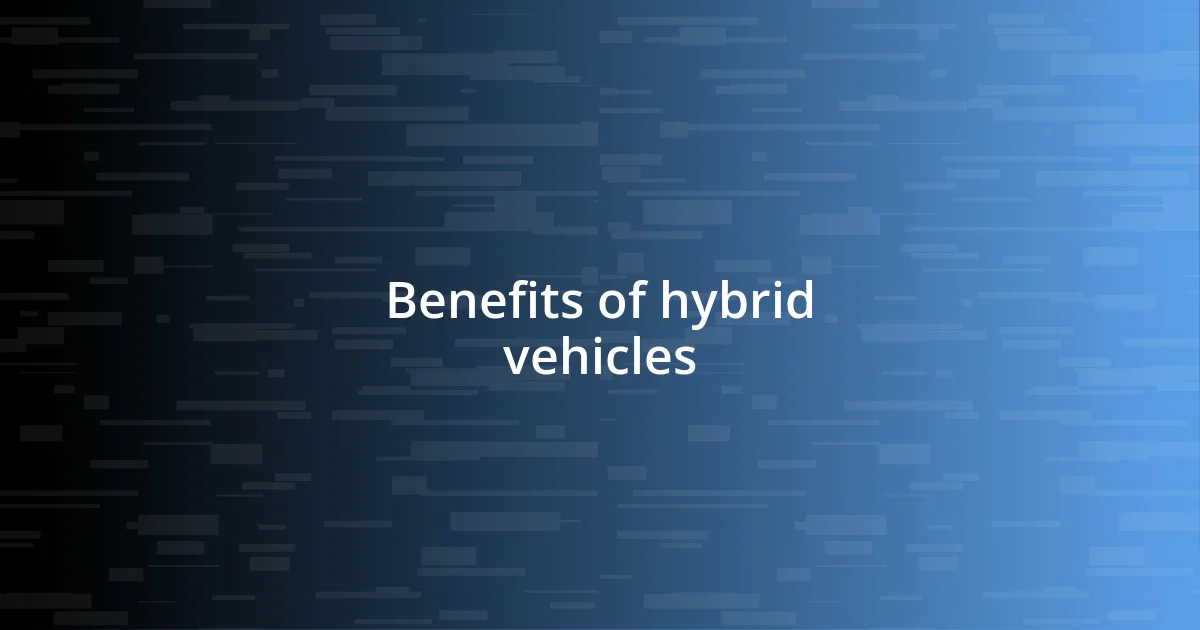
Benefits of hybrid vehicles
The benefits of hybrid vehicles are quite remarkable, especially for city driving. One aspect that stands out to me is their incredible fuel efficiency. I often recall a weekend trip I took where my hybrid managed to stretch a tank of gas longer than I anticipated—even with frequent stops. It felt rewarding knowing I was conserving fuel, which is not only good for my wallet but also for the environment.
Here are some key benefits of hybrid vehicles:
- Reduced Fuel Costs: Hybrids use less fuel than traditional combustion engines, saving money over time.
- Lower Emissions: They produce fewer greenhouse gases, making them a greener option for urban environments.
- Quiet Operation: The electric motor operates silently at low speeds, providing a peaceful driving experience.
- Regenerative Braking: This system recaptures energy from braking, enhancing efficiency.
- Tax Incentives: Many regions offer financial incentives for hybrid vehicle owners, increasing their attractiveness.
One of the most enchanting aspects of driving a hybrid is how smoothly the car handles start-and-stop traffic. I’ll never forget that moment when I was inching along during my city commute, and suddenly the engine turned off, switching to electric power. It felt surreal, like the vehicle and I were in sync, almost dancing through the gridlock. Such experiences affirm my belief that hybrid vehicles not only make sense but can transform daily driving into something positively engaging.

Key features for city driving
Navigating city streets in a hybrid vehicle brings unique advantages that cater to the urban landscape. One feature I truly appreciate is the compact size of many hybrids. The maneuverability makes fitting into tight parking spaces so much easier. I can still recall the day I effortlessly glided into a spot that seemed almost impossible for a larger car—it’s those little victories that make city driving so much more enjoyable.
Another key feature is the smart regenerative braking systems integrated into hybrids. They capture energy that’s typically lost when slowing down, which is particularly helpful in stop-and-go traffic. I once took a leisurely drive through downtown, and every time I hit the brakes, I could almost feel the system helping to recharge the battery. It wasn’t just about efficiency; it felt like my vehicle was working alongside me, making our journey together more efficient and sustainable.
Hybrids also come equipped with various driving modes tailored for city environments. For example, eco-mode maximizes efficiency by adjusting power consumption. I often switch to this mode during my morning commutes, and it’s amazing how it influences my driving style. I’ve noticed that not only do I save on fuel, but I also drive more mindfully, which ironically makes the commute feel less stressful. Embracing these features transforms my daily travels into a more harmonious experience.
| Feature | Benefit |
|---|---|
| Compact Size | Easier maneuverability in tight spaces |
| Regenerative Braking | Energy recapture during stop-and-go traffic |
| Driving Modes | Optimizes efficiency and lessens stress |
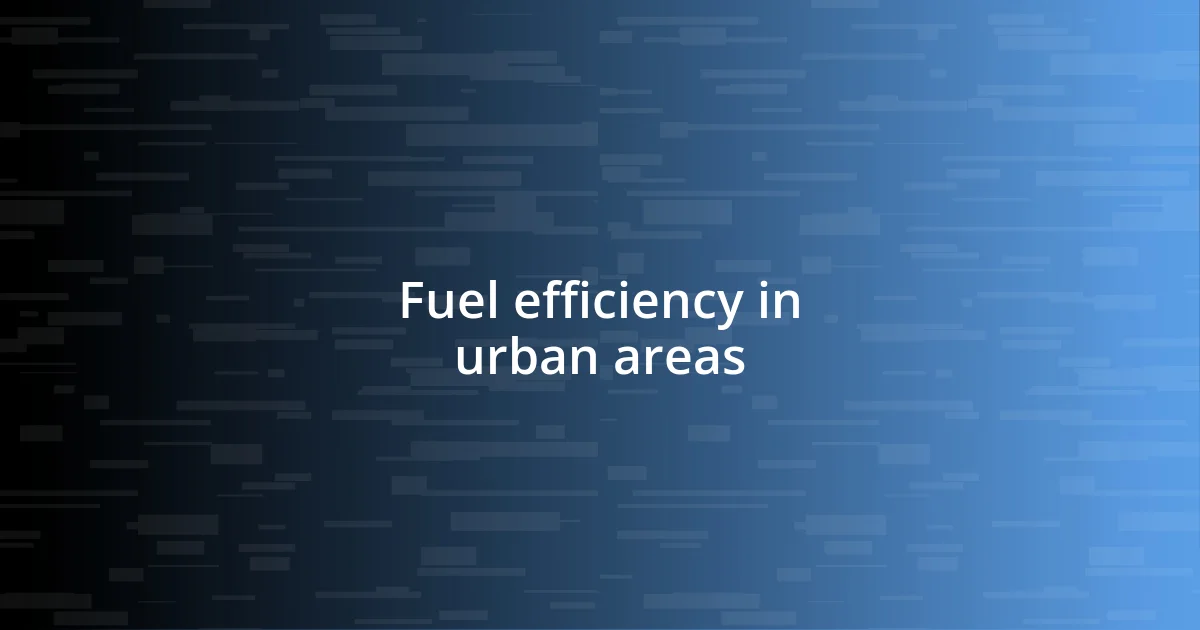
Fuel efficiency in urban areas
Fuel efficiency in urban areas is one of the foremost benefits of driving a hybrid. I still remember my excitement when I checked my fuel gauge during the busy workweek; I had barely used any gas despite navigating through constant stoplights and traffic. Isn’t it remarkable how hybrids excel in those start-and-stop scenarios? They use electric power at low speeds, seamlessly transitioning to fuel when needed, which can make a significant difference in your overall fuel economy.
When driving through tight city streets, I often find myself appreciating the fuel efficiency of my hybrid even more. There are days when I have to run multiple errands in quick succession, and I’ve noticed that my fuel consumption hardly spikes like it once did with a traditional vehicle. Reflecting on those days filled with short trips, I can’t help but think about how hybrids are designed for such city driving. Have you ever thought about how much more efficient urban travel could be if more drivers made the switch?
There’s something gratifying about doing my part for the environment while saving a few dollars each month. Each time I pull up to a pump and see how little fuel I’ve used, I feel a sense of empowerment. It’s like a small victory against rising gas prices, reinforcing my belief that choosing a hybrid isn’t merely a trend—it’s a smart and sustainable choice for anyone navigating our bustling cities.
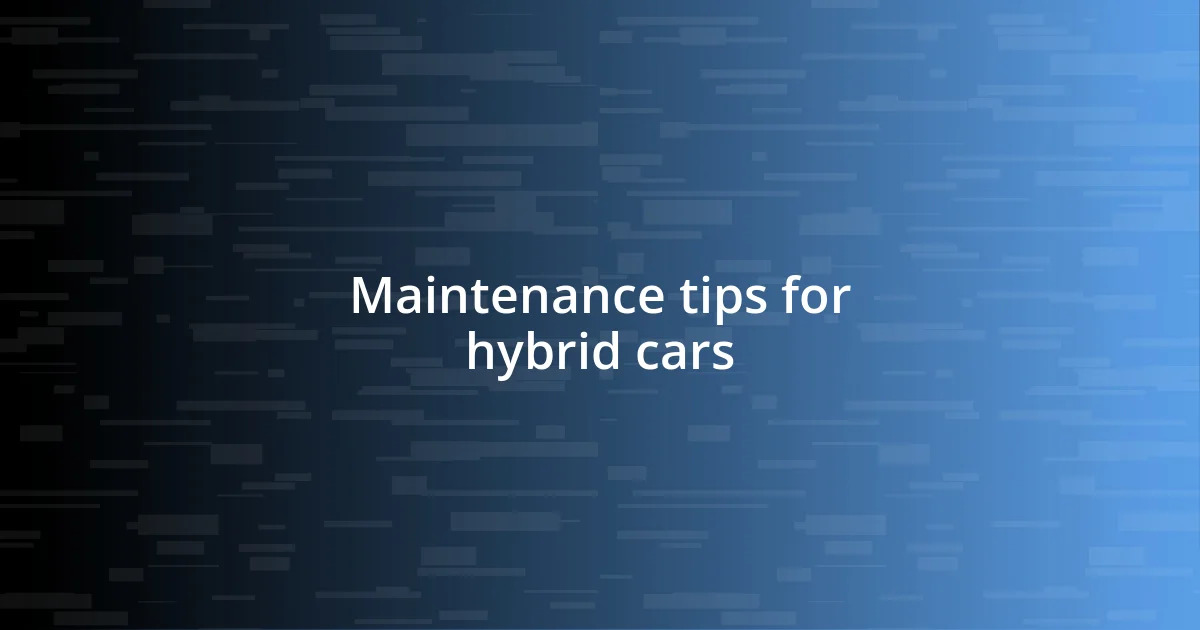
Maintenance tips for hybrid cars
When it comes to maintaining my hybrid vehicle, I prioritize regular checks on both the battery and the engine. The hybrid battery is the heart of the car, so I tend to monitor its performance closely. I recall a time when my car’s dashboard alerted me to a battery issue—I knew I needed to act fast. Addressing the problem early not only prevented a costly repair but also ensured my car continued to run efficiently, something every hybrid driver should be proactive about.
Tire maintenance is another critical aspect I focus on. I often find myself double-checking tire pressure because hybrids can be sensitive to rolling resistance. I remember a period when my fuel efficiency dipped unexpectedly; it turned out I had let the pressure slide. After inflating them to the recommended levels, I felt a noticeable difference—not just in mileage but also in the overall driving experience. Have you experienced similar shifts in performance just from something as simple as a tire check?
Lastly, keeping up with software updates is essential for my hybrid. I’ve learned that just like my smartphone, my vehicle’s systems need updates to stay running smoothly. One afternoon, I took the time to update the software and was surprised at how it improved the performance and responsiveness of my car’s features. It’s fascinating how technology has evolved in hybrids; staying informed and updated means I get the most out of my investment and ensure my driving experience remains both efficient and enjoyable.
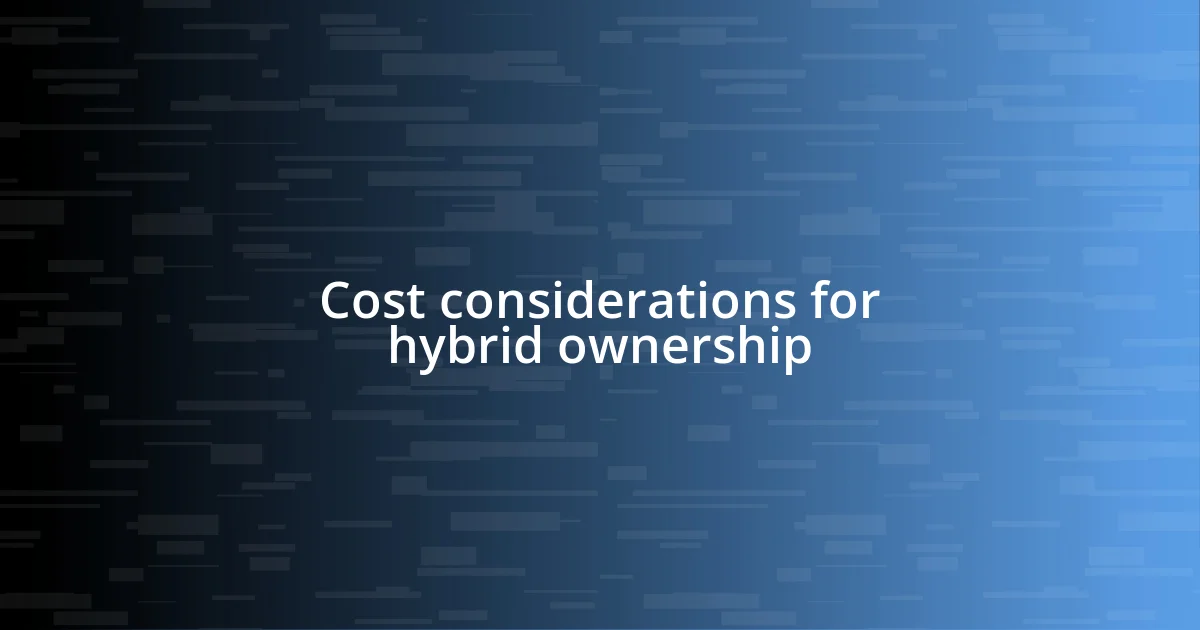
Cost considerations for hybrid ownership
Hybrid vehicles can bring about a varied landscape of costs to consider beyond the initial purchase price. When I decided to invest in my hybrid, I was pleasantly surprised to discover the tax incentives available. It felt reassuring to know that my eco-friendly choice could lead to some financial relief. Have you ever explored local incentives when considering a new car? They can substantially lessen the overall cost of ownership.
Insurance premiums can differ for hybrid owners, and I learned this firsthand. At first, I anticipated higher rates due to the advanced technology in hybrids. However, after some research, I found several insurance providers offering discounts for hybrid vehicles, reflecting their lower risk and potential for fewer accidents. It’s a small detail that can make a big difference in your monthly budget—who doesn’t appreciate saving money on their insurance?
Lastly, I can’t stress enough the importance of factoring in long-term utility costs. Sure, the fuel savings are fantastic, but I noticed my overall expenses remained lower thanks to fewer visits to the mechanic. By applying my experience, the reliability of hybrid technology often means less frequent repair costs over time. Isn’t it comforting to know that choosing a hybrid might lead to fewer unexpected expenses down the line?

Choosing the right hybrid vehicle
I’ve found that choosing the right hybrid vehicle requires considering factors like size and fuel efficiency. When I first began my search, I focused on hatchbacks and sedans, realizing they typically do better in city driving due to their compact nature. Have you ever thought about how maneuverability can impact your daily commute? In my experience, a smaller vehicle means I can navigate tight city streets and find parking with greater ease—a real win in urban settings.
Another key aspect is the vehicle’s technology features. I remember test-driving a model loaded with advanced tech, from regenerative braking to smart navigation systems that optimized my routes. The moment I experienced how these features enhanced my driving efficiency and experience, I felt a strong connection. I wonder, wouldn’t you want a vehicle that not only saves fuel but also feels like it’s designed to cater to your driving style and habits?
Lastly, I can’t overlook the importance of reviews and personal recommendations. Chatting with friends and family who own hybrids provided me with invaluable insights that no brochure could match. Listening to their stories about reliability, comfort, and real-world fuel economy helped me evaluate what I truly valued in a vehicle. Have you ever felt that a recommendation changed your perspective on a significant decision? For me, these conversations made all the difference in narrowing down my options.


